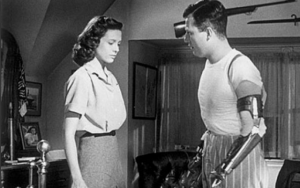Metro In Focus: Paying tribute to soldiers through film on Remembrance Day
 By Richard Crouse – Metro In Focus
By Richard Crouse – Metro In Focus
William Shakespeare wrote, “Praising what is lost makes the remembrance dear,” a fitting sentiment for the most solemn day on the calendar. Every November 11 we pay respect to “the men and women who have served, and continue to serve our country during times of war, conflict and peace.” In observation here’s a list of movies to serve as a backdrop on this sombre day.
The Best Years Of Our Lives is 70 years old but the story of servicemen struggling to rebuild their lives after the Second World War is timely and relevant. Perhaps it feels so authentic because the crew were all Second World War veterans and the main character, who faces discrimination after losing both hands in combat, was played by real-life Nova Scotia-born disabled vet Harold Russell. The actor, who lost both his hands while training paratroopers, won two Oscars for his work, a Best Supporting award and another for being an inspiration to all returning veterans, making him the only performer to win twice for the same role.
The Hill, a little known British film that features one of Sean Connery’s best performances, shows war from a different point of view. Set during the WWII in North Africa, it’s the story of a stockade run by Brits to punish deserters. Writer Ray Rigby based the screenplay on his two terms in military prison. Connery wedged it in between Goldfinger and Thunderball and it is a stark contrast to the glamorous work he was doing in the Bond films.
We can’t talk about war films on Remembrance Day without paying tribute to Canadian soldiers. A pair of films from Paul Gross, Passchendaele and Hyena Road, are the best-known homegrown explorations of Canadians in battle but they are very different films.
Passchendaele is a hybrid of romance and war movie based around the 1917 battle for Passchendaele that lasted four months and claimed 600,000 causalities on both sides. The story sprung from a conversation Gross had with his grandfather who told him about bayonetting a young German, killing him during a battle. Years later as his granddad lay dying in a hospital bed he asked for forgiveness over and over. Only Gross knew he was speaking to the young German he had killed in the First World War.
Gross based the screenplay for Hyena Road on another personal experience, conversations he had with Canadian troops in Afghanistan. It’s a complicated part of the world, but this isn’t a complicated movie. It’s a film that clearly and concisely states its thesis that this conflict isn’t a matter of winners or losers, but of uncertainty that will eventually lead to an end state. In that way it’s more Zero Dark Thirty than American Sniper.
“Passchendaele was partly the way it was because it was the bridge between the romantic period and the modern era,” says Gross. “I think Hyena Road is post-modern in that the nature of warfare contains almost no romanticism anymore. It’s very complicated.”
Hollywood has never shied away from depicting fighting Canadians. Christopher Plummer plays Canadian fighter pilot Colin Harvey in Battle of Britain, Lloyd Bridges was Canadian Commando Major Jamie Wilson in Attack on the Iron Coast and the Devil’s Brigade saw a special forces unit created from Canadian Army troops and a motley group of U.S. Army misfits.
